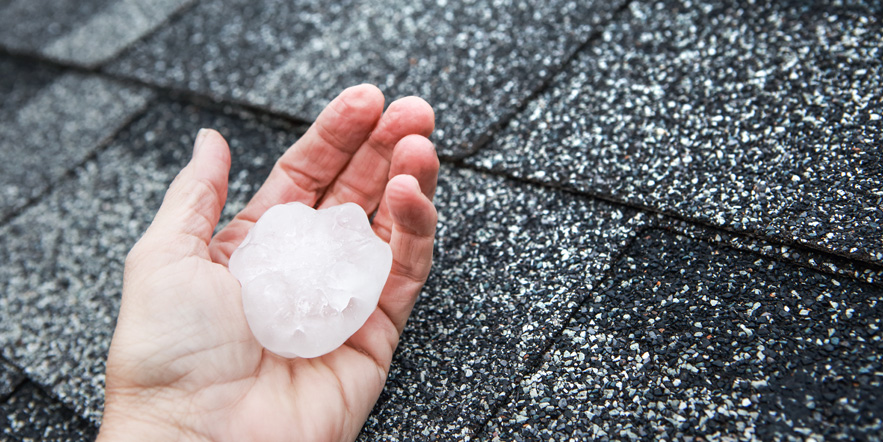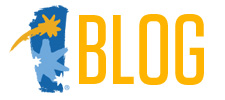If you’ve experienced hail before, you know that even minor hail can seriously damage roofs, gutters, siding, windows, landscaping, and even the hood of your car. Quarter-sized hail can destroy roof shingles, while golf ball-sized hail (about 1.5 inches in diameter) can split cedar.
Since hail storms can develop suddenly, taking precautionary measures in advance of a potential spring storm is your best bet to protect your property from costly losses. But if you do get caught unaware, there are steps you can take yourself, and with the help of a pro, to remedy the situation.
How Can I Prevent Hail Damage?
Have your roof inspected regularly and address any problems, such as blistering (pockets of moisture that evaporate, leaving behind bubble-like forms) or missing grains on asphalt shingles, which weaken your roof. It’s far more cost efficient to make small preventative repairs than it is to clean up after catastrophic leaks or damage.
You can also consider installing storm shutters on your windows and doors. They can be closed before an impending storm and can help protect glass from shattering.
If you don’t have covered parking, consider moving your car to the nearest parking garage if a hail storm is anticipated. If that isn’t an option, covering your car before the storm with hail blankets and other specialty car covers might provide some limited protection.
To protect landscaping, consider creating do-it-yourself covers with stakes and tarps. Place potted plants under lawn furniture, or under buckets that you’ve weighted down with stones. You can also drape hardware fabric over your tomato cages and climbing trellises to limit damage from smaller hail.

How Do I Assess Hail Damage?
Because hail can be so destructive, it’s important you visually inspect the complete exterior of your home for damage immediately after a hailstorm hits. If you suspect your home’s roof is damaged, consult a qualified contractor to request an assessment, preferably one experienced in repairing hail damage. You can also look for dents in your gutters and downspouts, which could be indications of hail impact.
You should also look for damage to your outdoor air condenser unit, deck, siding, windows, and other painted surfaces, noting any new dents or dings.
Be sure to check your landscaping for damage. It will be easy to spot: Hail will crush tender young plants, and break or harm branches on older perennials or young trees.
Finally, your car is especially susceptible to hail if left outside. Check the roof and hood of your car for pockmarks.
I Have Hail Damage, Now What?
Certain types of minor hail damage can be repaired by knowledgeable do-it-yourself homeowners. This includes fixing damaged siding with paint and caulking, repairing loose molding around windows, and mending or replacing damaged landscaping.
However, almost all other repairs, particularly if they are severe, or if the potential for future water intrusion seems likely, should be left to the professionals.
Take photos of the damage and submit a claim to your insurance company. Be sure to have an appraiser look over your damage before you engage in any repairs.
Make Sure You Don’t Do It Yourself (DDIY)
Roofs are dangerous to navigate and damage can be difficult to spot. It may show up as indentations or dents on metal roofs, but it can be notoriously difficult to spot on roofs of asphalt shingles. Call in a roofing contractor for an inspection. Typically, he’ll circle any suspected damaged areas with chalk and photograph them to include in a comprehensive damage assessment. He should also inspect your home’s chimney caps, roof vents, gutters, and other roof-top surfaces.
If your car is pockmarked but the paint is still intact, hail specialists can use customized tools to “pop” the dents out. This might sound simple, but it’s an acquired skill better left to experienced technicians.
Each new season will bring new storms. For peace of mind, be sure to prepare yourself and your home for the coming storms. And it’s all about protecting what’s important to you. See how Liberty Mutual Insurance can provide the coverage you need for your home.
 To learn more about Liberty Mutual Auto and Home Insurance, and the exclusive savings available for West Community Credit Union members, or to get a free, no-obligation quote, call Tara Frazier at (636) 300-9364 ext. 08553 or visit the Liberty Mutual Insurance website.
To learn more about Liberty Mutual Auto and Home Insurance, and the exclusive savings available for West Community Credit Union members, or to get a free, no-obligation quote, call Tara Frazier at (636) 300-9364 ext. 08553 or visit the Liberty Mutual Insurance website.




